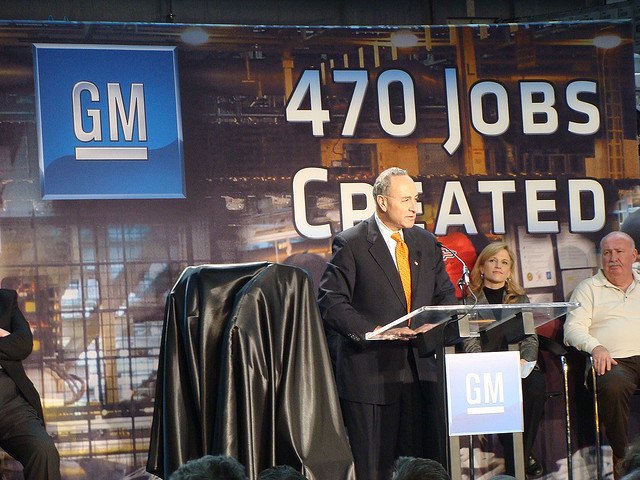GM Pummeled By Japanese Tsunami, Akerson Waits

It is one of those strange twists of fate that Toyota’s arch-nemesis, GM, would be one of the first overseas automakers to experience shutdowns caused by a lack of supplies from tsunami-devastated Japan.
Yesterday, nearly 60 workers were laid off at GM’s Tonawanda Engine facility, the Niagara Gazette reports. Is Tonawanda waiting for parts from Japan?
No, they are waiting for GM’s Shreveport Assembly plant in Louisiana to reopen. That plant will be shut down the week of March 21 due to a parts shortage caused the crisis in Japan.
Meanwhile in Europe, GM’s German incarnation Opel will stop the lines at its plant in Eisenach for two shifts on Monday and Tuesday due to a missing electronic part, sourced from a Japanese supplier, Automobilwoche [sub] says.
That after Opel had announced that it will stop the lines at its plant Zaragoza, Spain, for 24 hours this coming Monday, and again on Friday. Both plants make the Opel Corsa.
What we see here are just the first precursors of much bigger problems. High value electronic parts are air freighted. Those you’ll miss the day after. Cars, CKD kits, engines, transmissions and anything from Akebono brake pads to Denso spark plugs come by boat. There are several weeks of supply on the water. The real problems will begin in early April at the West Coast and a few weeks later at the East Coast and Europe when no ships come in.
What will GM do? They’ll wait it out. GM CEO Dan Akerson told reporters in Sao Paulo, where he was to fete the opening of a third shift at GM’s Sao Caetano do Sul plant, that GM will assess any parts problems in two weeks, says Reuters. “I would say over the next week or two we will have a better understanding not only about what is happening in Japan but also where we are on an inventory basis around the globe,” Akerson said.

Bertel Schmitt comes back to journalism after taking a 35 year break in advertising and marketing. He ran and owned advertising agencies in Duesseldorf, Germany, and New York City. Volkswagen A.G. was Bertel's most important corporate account. Schmitt's advertising and marketing career touched many corners of the industry with a special focus on automotive products and services. Since 2004, he lives in Japan and China with his wife <a href="http://www.tomokoandbertel.com"> Tomoko </a>. Bertel Schmitt is a founding board member of the <a href="http://www.offshoresuperseries.com"> Offshore Super Series </a>, an American offshore powerboat racing organization. He is co-owner of the racing team Typhoon.
More by Bertel Schmitt
Latest Car Reviews
Read moreLatest Product Reviews
Read moreRecent Comments
- 2manyvettes Since all of my cars have V8 gas engines (with one exception, a V6) guess what my opinion is about a cheap EV. And there is even a Tesla supercharger all of a mile from my house.
- Cla65691460 April 24 (Reuters) - A made-in-China electric vehicle will hit U.S. dealers this summer offering power and efficiency similar to the Tesla Model Y, the world's best-selling EV, but for about $8,000 less.
- FreedMike It certainly wouldn't hurt. But let's think about the demographic here. We're talking people with less money to spend, so it follows that many of them won't have a dedicated place to charge up. Lots of them may be urban dwellers. That means they'll be depending on the current charging infrastructure, which is improving, but isn't "there" yet. So...what would help EVs more, in my opinion, is improved charging options.
- RHD The analyses above are on the nose.It's a hell of a good car, but the mileage is reaching the point where things that should have worn out a long time ago, and didn't, will, such as the alternator, starter, exhaust system, PS pump, and so on. The interiors tend to be the first thing to show wear, other than the tires, of course. The price is too high for a car that probably has less than a hundred thousand miles left in it without major repairs. A complete inspection is warranted, of course, and then a lower offer based on what it needs. Ten grand for any 18-year-old car is a pretty good chunk of change. It would be a very enjoyable, ride, though.
- Fred I would get the Acura RDX, to replace my Honda HR-V. Both it and the CRV seats are uncomfortable on longer trips.



































Comments
Join the conversation
On the plus side, Japan isn't the sole source for all the high value electrical components. Japan makes 25% of the world's flash memory chips, but 75% of the world's production is intact. On the minus side, those alternate sources probably can't scale up production to replace Japanese output, so there will be shortages and cancelled production of low-demand vehicles, leading to lowered profits. Those alternate suppliers are likely going to charge an arm and a leg, leading to even lower profits and higher car prices. One thing to watch for is which automakers do the best job of scooping up the alternate suppliers' production. That could be a race for survival for some automakers.
GM is fundamentally frail and they've been looking to cherry pick an excuse for their financial weakness. The Japanese Tsunami might be just the trick they need to get their filthy paws back in our pockets via the loop between organized crime and corrupt politicians.